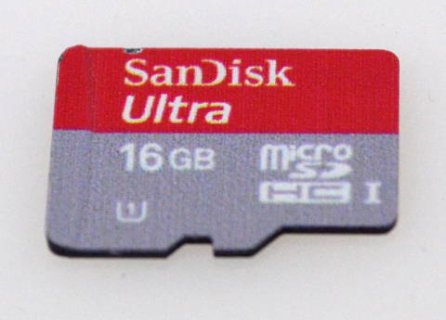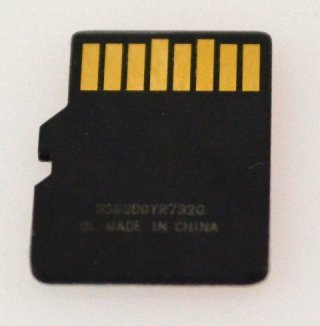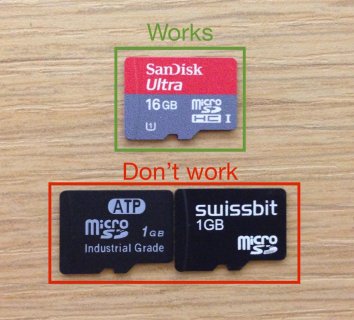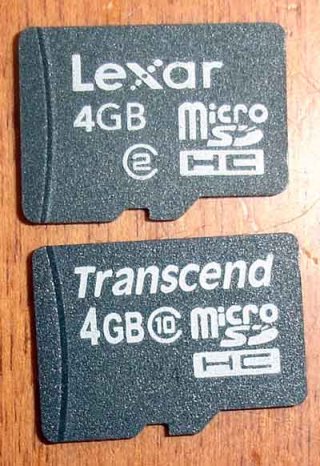Could someone with a Teensy 3.1, SD shield and an SD card run the following sketch and reply with the results? I've got mixed reports from 3 different people so far. For 2 it fails, but for 1 it runs fine and I'm out of ideas for why that might be the case.
Sketch:
Sketch:
Code:
/*
* This sketch illustrates raw write functions in SdFat that
* can be used for high speed data logging. These functions
* are used in the WaveRP library to record audio with the
* Adafruit Wave Shield using the built-in Arduino ADC.
*
* The WaveRP library captures data from the ADC in an ISR
* that is driven driven by timer one. Data is collected in
* two 512 byte buffers and written to the SD card.
*
* This sketch simulates logging from a source that produces
* data at a constant rate of one block every MICROS_PER_BLOCK.
*
* If a high quality SanDisk card is used with this sketch
* no overruns occur and the maximum block write time is
* under 2000 micros.
*
* Note: WaveRP creates a very large file then truncates it
* to the length that is used for a recording. It only takes
* a few seconds to erase a 500 MB file since the card only
* marks the blocks as erased; no data transfer is required.
*/
#include <SdFat.h>
#include <SdFatUtil.h>
#include <SPI.h>
// SD chip select pin
const uint8_t chipSelect = SS;
// number of blocks in the contiguous file
const uint32_t BLOCK_COUNT = 10000UL;
// time to produce a block of data
const uint32_t MICROS_PER_BLOCK = 10000;
// file system
SdFat sd;
// test file
SdFile file;
// file extent
uint32_t bgnBlock, endBlock;
// Serial output stream
ArduinoOutStream cout(Serial);
//------------------------------------------------------------------------------
// store error strings in flash to save RAM
#define error(s) sd.errorHalt_P(PSTR(s))
//------------------------------------------------------------------------------
// log of first overruns
#define OVER_DIM 20
struct {
uint32_t block;
uint32_t micros;
} over[OVER_DIM];
//------------------------------------------------------------------------------
void setup(void) {
Serial.begin(115200);
while (!Serial) {} // wait for Leonardo
SPI.begin();
}
//------------------------------------------------------------------------------
void loop(void) {
while (Serial.read() >= 0) {}
// pstr stores strings in flash to save RAM
cout << pstr("Type any character to start\n");
while (Serial.read() <= 0) {}
delay(400); // catch Due reset problem
cout << pstr("Free RAM: ") << FreeRam() << endl;
// initialize the SD card at SPI_FULL_SPEED for best performance.
// try SPI_HALF_SPEED if bus errors occur.
if (!sd.begin(chipSelect, SPI_FULL_SPEED)) sd.initErrorHalt();
// delete possible existing file
sd.remove("RAW.TXT");
// create a contiguous file
if (!file.createContiguous(sd.vwd(), "RAW.TXT", 512UL*BLOCK_COUNT)) {
error("createContiguous failed");
}
// get the location of the file's blocks
if (!file.contiguousRange(&bgnBlock, &endBlock)) {
error("contiguousRange failed");
}
//*********************NOTE**************************************
// NO SdFile calls are allowed while cache is used for raw writes
//***************************************************************
// clear the cache and use it as a 512 byte buffer
uint8_t* pCache = (uint8_t*)sd.vol()->cacheClear();
// fill cache with eight lines of 64 bytes each
memset(pCache, ' ', 512);
for (uint16_t i = 0; i < 512; i += 64) {
// put line number at end of line then CR/LF
pCache[i + 61] = '0' + (i/64);
pCache[i + 62] = '\r';
pCache[i + 63] = '\n';
}
cout << pstr("Start raw write of ") << file.fileSize() << pstr(" bytes at\n");
cout << 512000000UL/MICROS_PER_BLOCK << pstr(" bytes per second\n");
cout << pstr("Please wait ") << (BLOCK_COUNT*MICROS_PER_BLOCK)/1000000UL;
cout << pstr(" seconds\n");
// tell card to setup for multiple block write with pre-erase
if (!sd.card()->erase(bgnBlock, endBlock)) error("card.erase failed");
if (!sd.card()->writeStart(bgnBlock, BLOCK_COUNT)) {
error("writeStart failed");
}
// init stats
uint16_t overruns = 0;
uint32_t maxWriteTime = 0;
uint32_t t = micros();
uint32_t tNext = t;
// write data
for (uint32_t b = 0; b < BLOCK_COUNT; b++) {
// write must be done by this time
tNext += MICROS_PER_BLOCK;
// put block number at start of first line in block
uint32_t n = b;
for (int8_t d = 5; d >= 0; d--){
pCache[d] = n || d == 5 ? n % 10 + '0' : ' ';
n /= 10;
}
SPI.setBitOrder(MSBFIRST);
SPI.setClockDivider(SPI_CLOCK_DIV2);
SPI.setDataMode(SPI_MODE1);
SPI.transfer(0X15);
// write a 512 byte block
uint32_t tw = micros();
if (!sd.card()->writeData(pCache)) error("writeData failed");
tw = micros() - tw;
// check for max write time
if (tw > maxWriteTime) {
maxWriteTime = tw;
}
// check for overrun
if (micros() > tNext) {
if (overruns < OVER_DIM) {
over[overruns].block = b;
over[overruns].micros = tw;
}
overruns++;
// advance time to reflect overrun
tNext = micros();
}
else {
// wait for time to write next block
while(micros() < tNext);
}
}
// total write time
t = micros() - t;
// end multiple block write mode
if (!sd.card()->writeStop()) error("writeStop failed");
cout << pstr("Done\n");
cout << pstr("Elapsed time: ") << setprecision(3)<< 1.e-6*t;
cout << pstr(" seconds\n");
cout << pstr("Max write time: ") << maxWriteTime << pstr(" micros\n");
cout << pstr("Overruns: ") << overruns << endl;
if (overruns) {
uint8_t n = overruns > OVER_DIM ? OVER_DIM : overruns;
cout << pstr("fileBlock,micros") << endl;
for (uint8_t i = 0; i < n; i++) {
cout << over[i].block << ',' << over[i].micros << endl;
}
}
// close file for next pass of loop
file.close();
Serial.println();
}




